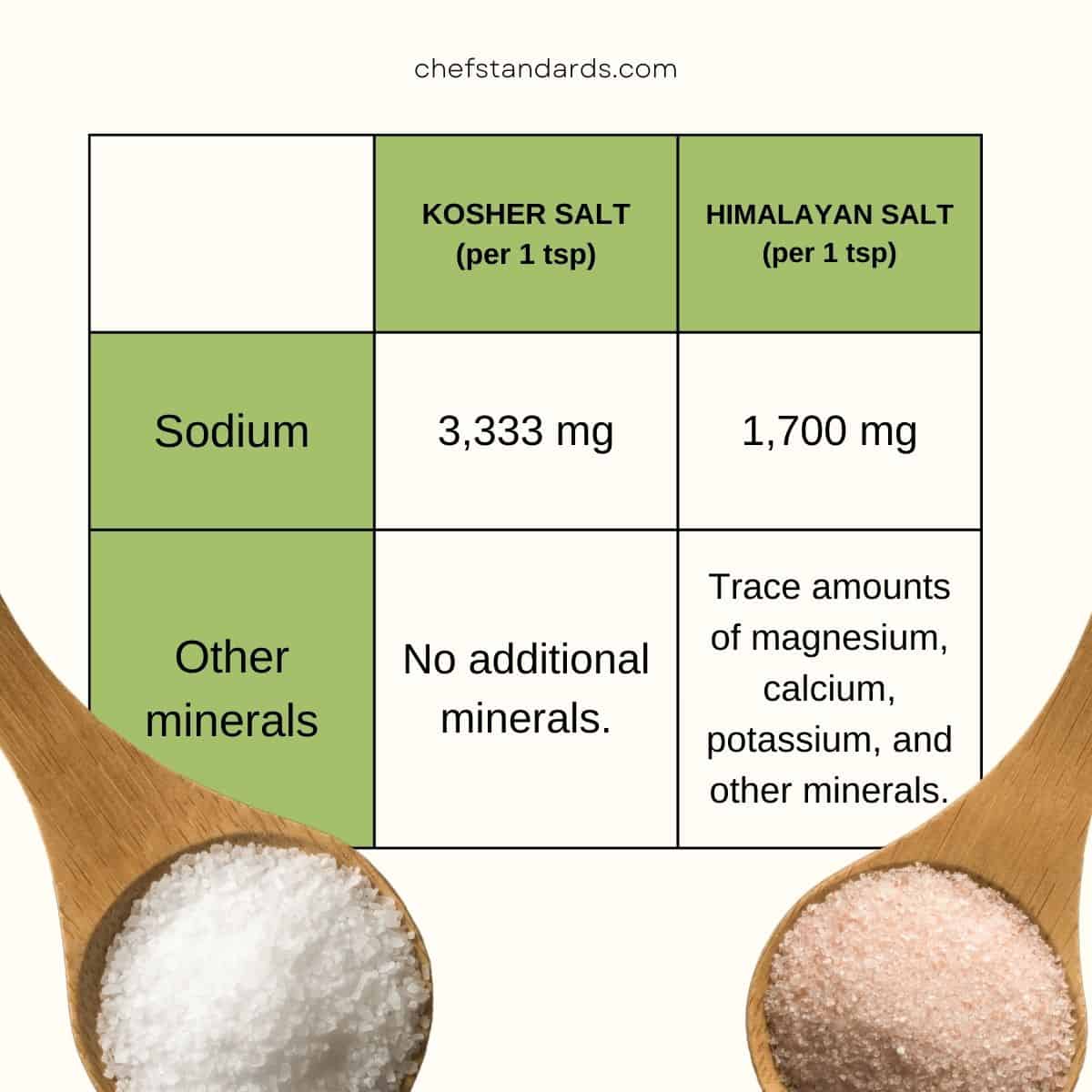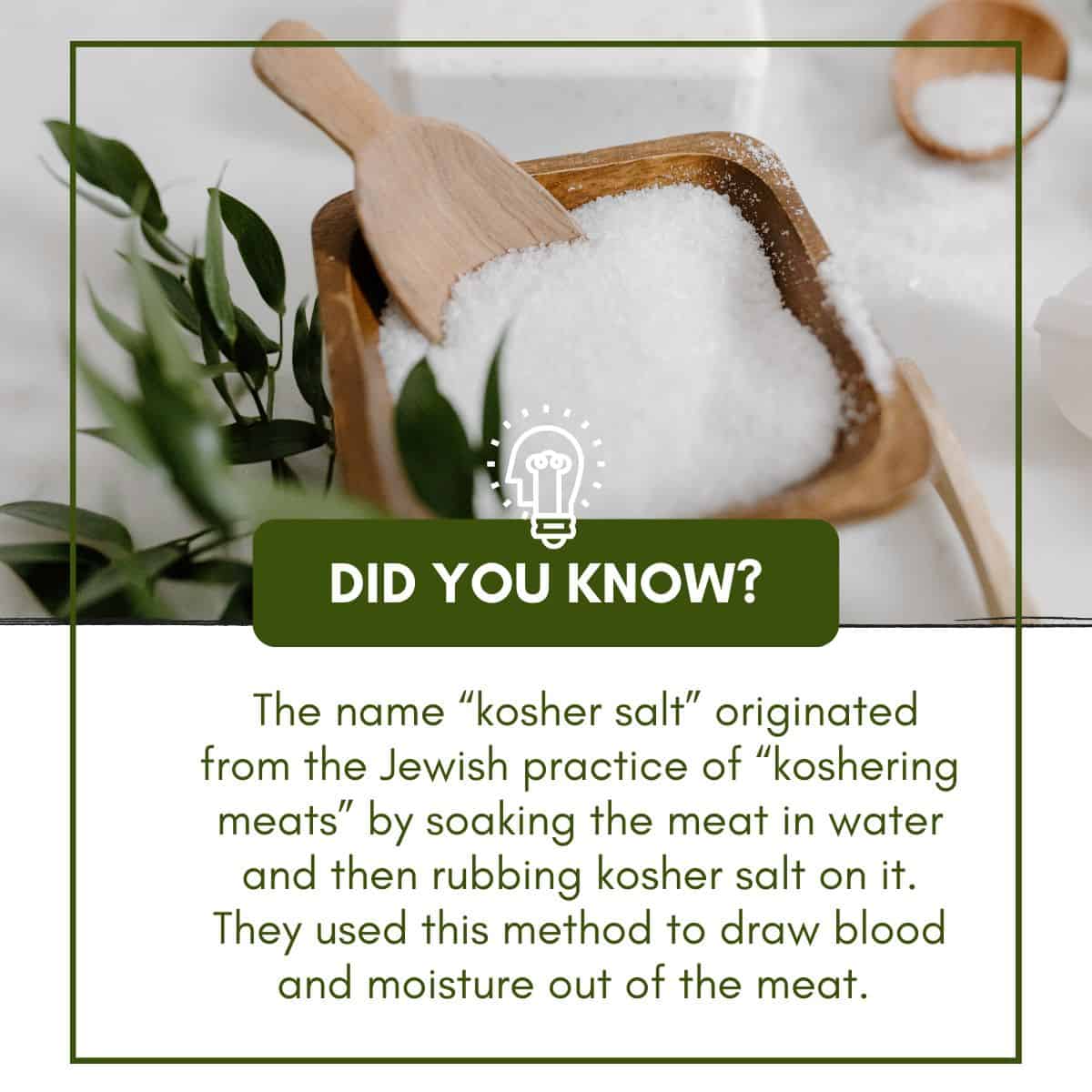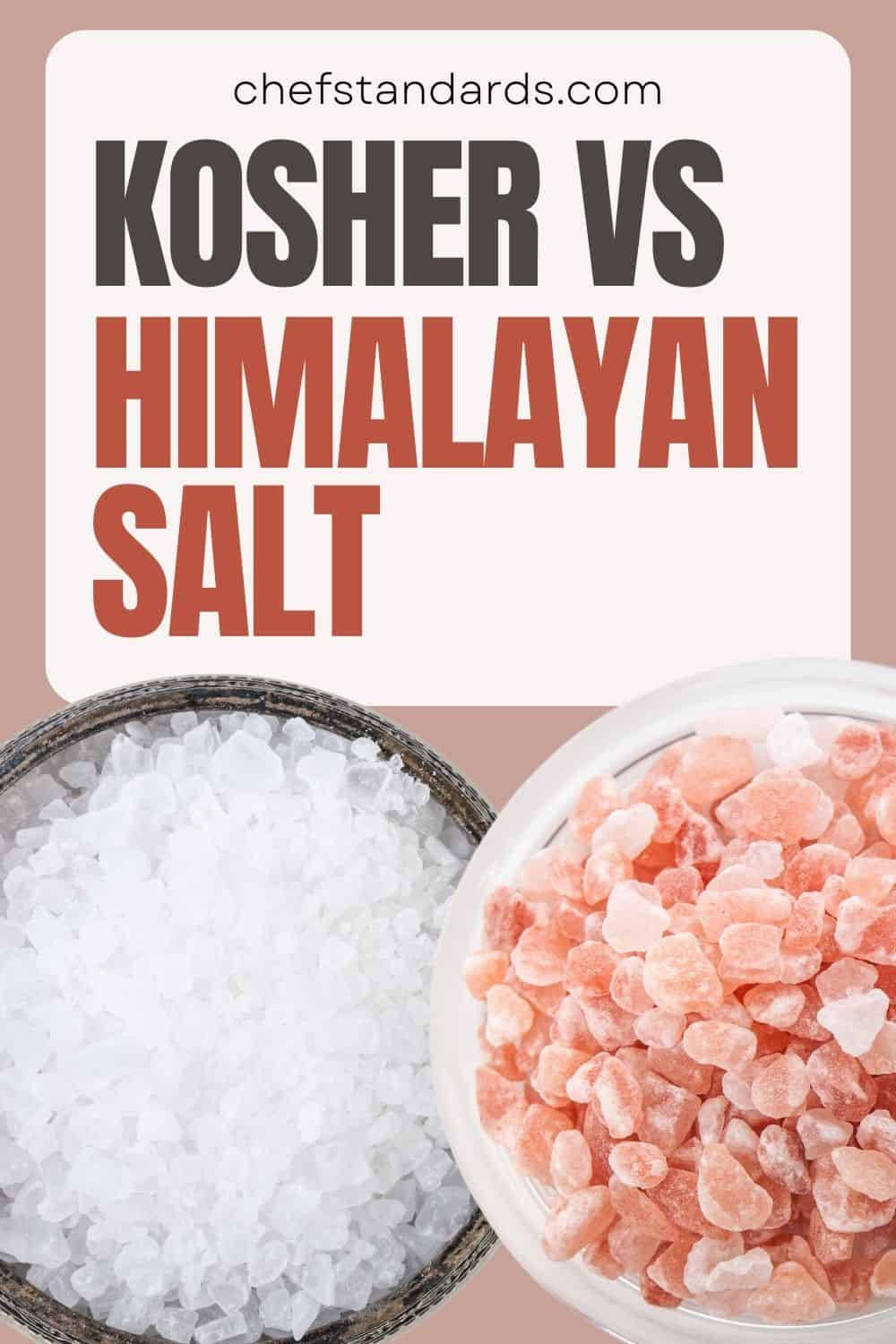Kosher salt and Himalayan salt are two different types of salt. Kosher salt is extracted by evaporating sea water or from underground rock deposits, whereas Himalayan salt is mined from areas close to the Himalayas (often in Pakistan).
Below you’ll find their main differences explained in detail and you’ll also find the answers to the controversial questions: Which one of these two salts is healthier and why is Himalayan salt much pricier than other salts? So, let’s see!
Kosher salt Vs Himalayan Salt: 10 Differences
From the extraction method to price, here are the main differences between kosher salt and Himalayan salt:
1. Extraction method
Kosher salt has two extraction methods, while Himalayan salt has only one:
Kosher salt is obtained from underground salt deposits and by evaporating seawater. The main difference lies in the way it is processed, which we’ll talk about in the next section called ‘Processing’.
Himalayan salt is made from rock crystals of salt that have been mined from areas close to the Himalayas, often in Pakistan. The Khewra Salt Mine in Pakistan is one of the oldest salt mines in the world.
If you’re interested in the mining process of Himalayan salt, then check out the video below:
2. Processing
Kosher salt is one of the most processed salts available, whereas Himalayan salt is minimally processed.
Kosher salt is made entirely of sodium chloride, which means it doesn’t contain any iodine, trace minerals, anti-caking or anti-clumping agents. Therefore, many manufacturers add iodine to the kosher salt in the post-processing phase.
Himalayan salt already contains iodine and trace minerals as naturally occurring elements, so there’s no need to add some extra iodine to the salt.
3. Nutrients
Kosher salt is mostly composed of sodium chloride (without any other minerals).
On the other hand, Himalayan salt has lower amounts of sodium chloride than kosher salt and high amounts of trace minerals like magnesium, calcium, potassium, bicarbonate, bromide, borate, strontium, and fluoride.
NOTE: Both kosher salt and Himalayan salt don’t contain any additives.

4. Color
Kosher salt consists of pure white flakes, whereas Himalayan salt comes in tones that range from light pinkish to orange and red due to mineral impurities in the salt.
5. Grain size
Kosher salt has larger and rougher grains than other types of salt. Also, it has a coarse texture.
Himalayan salt has different grain sizes that are smaller than kosher salt. Himalayan salt has a fine and sturdy texture.
6. Dissolution
Given that kosher salt has larger grains, it takes longer to dissolve this type of salt in food or water.
Himalayan salt dissolves easily in food or water. However, a small percentage of Himalayan salt doesn’t get dissolved and as a result, settles at the bottom.
7. Taste
Kosher salt has a clean, straightforward salty flavor that isn’t too sharp for your palate.
Himalayan salt has a more complex flavor profile because it naturally contains lots of different minerals. It has a mild level of saltiness.
8. Use
Kosher salt is most popularly used for brining, pickling, smoking, or curing meat. You can also use it to make seasoned salt for your Kennebec fries. Apart from being used in the kitchen, kosher salt is also used as a cleaning agent (e.g. to remove stubborn bits of food).
Himalayan salt is used for cooking (meat, poultry, eggs, fish, fruits, vegetables), food representation, decorative lamps, or spa treatments. Here are a few healing ways to use Himalayan salt.

9. Health benefits
Both kosher salt and Himalayan salt have their own health benefits.
Here are some health benefits of kosher salt:
• Promotes digestion
• Supports thyroid function
• Helps heal gum infections
• Regulates body temperature
• Helps fight allergies
Some health benefits of Himalayan salt include the following:
• Improves respiratory diseases
• Regulates blood pressure
• Balances your body’s pH
• Reduces signs of aging
• Regulates blood sugar…
I also have to emphasize that these two types of salt can be a healthy alternative to Accent seasoning when making it at home.
10. Price
Himalayan salt is more expensive than kosher salt. The average price of kosher salt per 1 pound is around $2, whereas the average price of Himalayan salt per 1 pound is around $7.
Why is Himalayan salt more expensive than kosher and other salts?
The cost of mining Himalayan salt is low and one of the largest pink salt mines, The Khewra Salt Mine, produces around 350,000 tons per year.
FOOD FOR THOUGHT: There’s plenty of Himalayan salt out there and the mining itself is not that expensive. So, why is this salt much pricier than other types of salt? Is Himalayan salt healthier than other salts or does the main difference come from marketing?
HINT: Find out in the next paragraph.
Is Himalayan salt healthier than kosher salt?
Kosher salt is better for your wallet because it’s less expensive than Himalayan salt, but which one is better for your health?
Even though kosher salt doesn’t contain trace minerals like Himalayan salt, this doesn’t make it less healthy. Here’s how WebMD supports this argument:
“Research has not shown that Himalayan salt has any unique health benefits compared to other dietary salts. The mineral impurities that give it a pink color, often promoted as healthful, are far too low in concentration to help with your nutrition.”
Another important element in this story is sodium chloride.
Chemically known as sodium chloride, salt is vital for our health regardless of its source. Salt assists in nerve function, helps our body regulate blood pressure, and helps our cells keep organs healthy.
Given that both kosher salt and Himalayan salt are great sources of sodium chloride, neither one of these salts is proven to be healthier. Both salts are equally beneficial, so why does Himalayan salt cost more than kosher and other types of salt?
PLOT TWIST: Perhaps the main difference in price between Himalayan salt and other types of salt, indeed, comes from marketing.
Which Type Of Salt Do You Prefer?
Kosher salt and Himalayan salt may have some differences regarding color or flavor profile, but they are both beneficial for our health.
Both salts can be used for different types of dishes, and the only difference lies in your preference.
Do you prefer Himalayan salt because of its more complex flavor and pinkish color? Or do you prefer kosher salt because of its coarse texture and larger grains?
The choice is yours. However, remember that the main difference between these two salts lies in their price, which is most probably influenced by marketing.
See also: 5 Main Differences Between Sea Salt Vs Himalayan Salt

